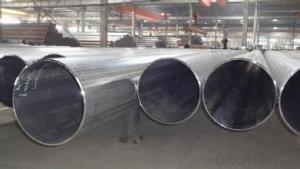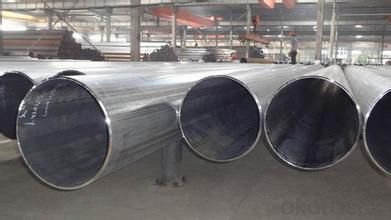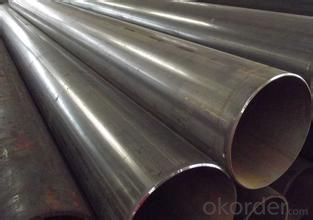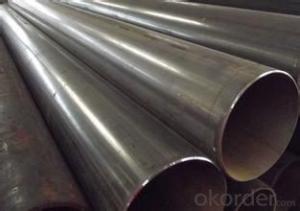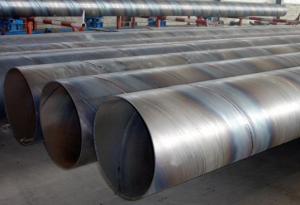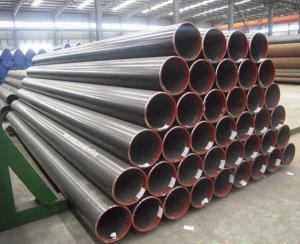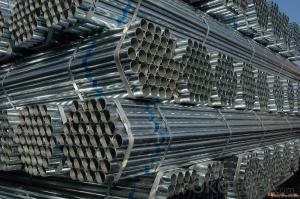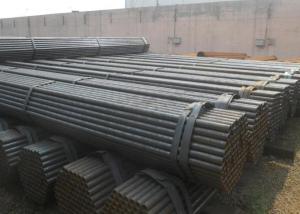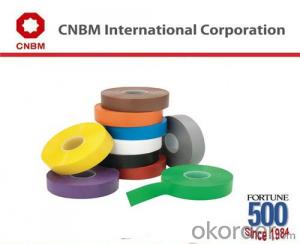A Aariety of High-frequency Welded Pipe ERW Utility
- Loading Port:
- China main port
- Payment Terms:
- TT or LC
- Min Order Qty:
- 10 m.t.
- Supply Capability:
- 5000 m.t./month
OKorder Service Pledge
OKorder Financial Service
You Might Also Like
Product Description:
It is widely applied to line pipe and casing and tubing in oil transportation and casing field, and it is used in Low,high pressure liquid and gassy transportation and it is also good Structure pipe (for furniture, window, door, building , bridge, mechanical etc).
Standard of ERW Welded Pipes: API SPEC 5L, API SPEC 5CT, ASTM A53, GB/T9711.1
Steel Grade of ERW Welded Pipes:API SPEC 5L: B, X42, X46, X52, X56, X60, X65
API SPEC 5CT: J55, K55, N80, L80-1
ASTM A53: A, B, C
GB/T9711.1:L242、L290、L320、L360、L390、L415、L450
Sizes of ERW Welded Pipes:
Standard: GB/9711.1
Mechanical Properties
Remark: Besides below sizes, we also can arrange production based on requirement of customers
OD | WT | WEIGHT | ||||
INCH | MM | SCH | MM | INCH | KG/M | LB/INCH |
1 1/2” | 48.3 | STD-40 | 3.68 | 0.145 | 4.09 | 2.75 |
1 1/2” | 48.3 | XS-80 | 5.08 | 0.2 | 5.47 | 3.68 |
2” | 60.3 | STD-40 | 3.91 | 0.154 | 5.49 | 3.69 |
2” | 60.3 | XS-80 | 5.54 | 0.218 | 7.56 | 5.08 |
2 1/2” | 73 | STD-40 | 5.16 | 0.203 | 8.72 | 5.86 |
2 1/2” | 73 | XS-80 | 7.01 | 0.276 | 11.52 | 7.74 |
3” | 88.9 | STD-40 | 5.49 | 0.216 | 11.41 | 7.67 |
3” | 88.9 | XS-80 | 7.62 | 0.3 | 15.43 | 10.37 |
3 1/2” | 101.6 | STD-40 | 5.74 | 0.226 | 13.71 | 9.21 |
3 1/2” | 101.6 | XS-80 | 8.08 | 0.318 | 18.83 | 12.65 |
4” | 114.3 | STD-40 | 6.02 | 0.237 | 16.24 | 10.91 |
4” | 114.3 | XS-80 | 8.56 | 0.337 | 22.55 | 15.15 |
5” | 141.3 | STD-40 | 6.55 | 0.258 | 21.99 | 14.78 |
5” | 141.3 | XS-80 | 9.53 | 0.375 | 31.28 | 21.02 |
6” | 168.3 | STD-40 | 7.11 | 0.28 | 28.55 | 19.19 |
6” | 168.3 | XS-80 | 10.97 | 0.432 | 42.99 | 28.89 |
8” | 219.1 | STD-40 | 8.18 | 0.322 | 42.98 | 28.88 |
8” | 219.1 | XS-80 | 12.7 | 0.5 | 65.3 | 43.88 |
10” | 273 | STD-40 | 9.27 | 0.365 | 60.9 | 40.92 |
10” | 273 | 80 | 15.09 | 0.594 | 96.95 | 65.15 |
12” | 323.8 | STD | 9.53 | 0.375 | 74.61 | 50.13 |
12” | 323.8 | 40 | 10.31 | 0.406 | 80.51 | 54.1 |
12” | 323.8 | XS | 12.7 | 0.5 | 98.42 | 66.14 |
12” | 323.8 | 80 | 17.48 | 0.688 | 133.38 | 89.63 |
14” | 355.6 | 40 | 11.13 | 0.438 | 95.51 | 64.18 |
14” | 355.6 | XS | 12.7 | 0.5 | 108.48 | 72.9 |
14” | 355.6 | 80 | 19.05 | 0.75 | 159.71 | 107.32 |
16” | 406.4 | XS-40 | 12.7 | 0.5 | 124.55 | 83.69 |
18” | 457 | STD | 9.53 | 0.375 | 106.23 | 71.38 |
18” | 457 | 40 | 14.27 | 0.562 | 157.38 | 105.75 |
18” | 457 | 80 | 23.83 | 0.938 | 257.13 | 172.78 |
20” | 508 | 40 | 15.09 | 0.594 | 185.28 | 124.5 |
20” | 508 | 80 | 26.19 | 1.031 | 314.33 | 211.22 |
FAQ of Welded Pipe:
①How is the quality of your products?
Our products are manufactured strictly according to national and internaional standard, and we take a test on every pipe before delivered out. If you want see our quality certifications and all kinds of testing report, please just ask us for it.
Guaranteed: If products’ quality don’t accord to discription as we give or the promise before you place order, we promise 100% refund.
②How about price?
Yes, we are factory and be able to give you lowest price below market one, and we have a policy that “ for saving time and absolutely honest business attitude, we quote as lowest as possible for any customer, and discount can be given according to quantity”,if you like bargain and factory price is not low enough as you think, just don’t waste your time.Please trust the quotation we would give you, it is professional one.
③Why should you chose us?
Chose happens because of quality, then price, We can give you both.Additionally, we can also offer professional products inquiry, products knowledge train(for agents), smooth goods delivery, exellent customer solution proposals.Our service formula: good quality+good price+good service=customer’s trust
SGS test is available, customer inspection before shipping is welcome, third party inspection is no problem.
Any question, pls feel free to contact us !
Welded Pipe Images:
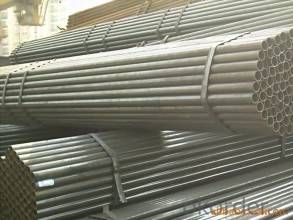
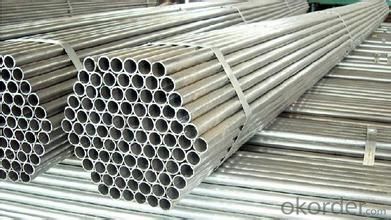
- Q: Can steel pipes be used for the construction of high-rise buildings?
- Yes, steel pipes can be used for the construction of high-rise buildings. Steel pipes offer several advantages such as high strength, durability, and resistance to fire and corrosion. They can be used for various structural elements including columns, beams, and bracing systems, providing a reliable and cost-effective solution for constructing tall buildings.
- Q: How are steel pipes used in the manufacturing of automobiles?
- Steel pipes are commonly used in the manufacturing of automobiles due to their strength, durability, and versatility. They are used in various applications throughout the automobile manufacturing process. One of the main uses of steel pipes in automobiles is for the construction of the vehicle's chassis and body. Steel pipes are often used as structural components to provide strength and rigidity to the vehicle. They can be bent, shaped, and welded to form the desired structure, making them an ideal choice for automotive applications. Steel pipes are also used in the exhaust system of automobiles. The exhaust system is responsible for guiding and directing the exhaust gases away from the engine. Steel pipes are used to create the exhaust manifold, which collects the gases from the engine's cylinders, as well as the exhaust pipes and mufflers. The high temperature resistance and corrosion resistance of steel make it suitable for withstanding the harsh conditions of the exhaust system. In addition, steel pipes are used in the cooling system of automobiles. They are used to transport coolant from the engine to the radiator and back, helping to regulate the engine's temperature. Steel pipes are preferred for this application due to their ability to handle high pressure and temperature, as well as their resistance to corrosion and chemical damage. Moreover, steel pipes are used in the fuel system of automobiles. They are used to transport fuel from the tank to the engine, ensuring a steady and reliable supply of fuel. Steel pipes are chosen for this application because they are resistant to corrosion and can handle the high pressure and temperature associated with fuel transportation. In summary, steel pipes are essential in the manufacturing of automobiles. They are used in the construction of the chassis and body, the exhaust system, the cooling system, and the fuel system. Their strength, durability, and versatility make them a preferred choice for automotive applications.
- Q: How are steel pipes used in the aerospace industry?
- The aerospace industry extensively utilizes steel pipes for various purposes. Aircraft frames heavily rely on steel pipes as they offer the necessary strength and structural integrity. Steel pipes find applications in the fuselage, wings, and landing gear of airplanes, as well as in rocket launch vehicles and space shuttles. The aerospace industry favors steel pipes due to their exceptional strength-to-weight ratio. They possess lightweight properties while maintaining immense strength, enabling the construction of robust and dependable aerospace structures. This aspect proves crucial in the industry as weight reduction significantly improves fuel efficiency and overall performance. Steel pipes also serve the purpose of transporting fluids and gases within aircraft systems. They commonly operate in the hydraulic and fuel systems, facilitating the flow of vital fluids like hydraulic fluid, fuel, and coolant. By ensuring the safe and efficient movement of these fluids throughout the aircraft, steel pipes contribute to its proper functioning and performance. Furthermore, steel pipes find utility in the aerospace industry for heat transfer applications. They form an integral part of the aircraft's cooling systems, aiding in the dissipation of heat generated by engines, electrical components, and other systems. With their exceptional thermal conductivity, steel pipes effectively transfer heat away from critical areas, preventing overheating. In conclusion, steel pipes possess a crucial role in the aerospace industry. They contribute to aircraft construction by providing strength and structural integrity, as well as facilitating fluid and gas transportation and heat transfer. The utilization of steel pipes in the aerospace industry ensures the safety, efficiency, and reliability of aerospace structures and systems.
- Q: 304 stainless steel tube with the diameter of 25*2-3 is what mean
- The quality of the steel pipe should be in line with the national standard "stainless steel seamless pipe for fluid transportation" (GBT 14976-2012) requirements.
- Q: What is the weight of a steel pipe?
- The weight of a steel pipe can vary depending on its size, length, and thickness. To determine the weight, you would need specific measurements of the pipe.
- Q: Can steel pipes be used in high-pressure applications?
- Yes, steel pipes can be used in high-pressure applications. Steel pipes are known for their strength and durability, making them suitable for handling high pressures in various industries such as oil and gas, water distribution, and chemical processing.
- Q: How do you protect steel pipes from rusting?
- To protect steel pipes from rusting, several methods can be employed. One common approach is to apply a protective coating to the pipes. This can be done by using paint or other types of protective coatings designed specifically for metal surfaces. The coating acts as a barrier between the steel and the elements, preventing moisture and oxygen from coming into contact with the metal and causing rust. Another method is to galvanize the steel pipes. Galvanizing involves coating the pipes with a layer of zinc, which creates a protective barrier that prevents rust from forming. This process is commonly used for outdoor applications or in environments where the pipes are exposed to moisture. Regular maintenance is also crucial in protecting steel pipes from rusting. This includes inspecting the pipes for any signs of corrosion or damage and promptly addressing any issues that are found. Additionally, keeping the pipes clean and dry can help prevent rust formation. In some cases, installing sacrificial anodes can provide additional protection against rust. Sacrificial anodes are made of a more reactive metal, such as zinc or magnesium, and are attached to the steel pipes. These anodes corrode instead of the steel, sacrificing themselves to protect the pipes from rust. Lastly, proper storage and handling of steel pipes is essential. This means storing them in a dry, well-ventilated area, away from moisture and humidity. It is also important to handle the pipes with care to avoid any scratches or damage to the protective coatings. By employing these methods and practices, steel pipes can be effectively protected from rusting, ensuring their longevity and durability.
- Q: How are steel pipes used in offshore wind farms?
- Steel pipes are used in offshore wind farms for a variety of purposes. They are commonly used as foundation structures to support wind turbine towers, providing stability and strength in the harsh marine environment. Steel pipes are also used for subsea cables and pipelines, allowing for the transportation of electricity and other resources. Additionally, they play a crucial role in the installation of offshore wind turbines, serving as installation aids and providing access for maintenance and repair activities. Overall, steel pipes are essential components in the construction, operation, and maintenance of offshore wind farms.
- Q: What is the cost of steel pipes compared to other piping materials?
- The cost of steel pipes can vary based on factors like size, grade, and specifications, as well as market conditions and location. Generally, steel pipes are more expensive than materials like PVC or HDPE. However, when compared to materials like copper or stainless steel, steel pipes can often be more cost-effective. Steel pipes are known for their durability, strength, and resistance to high pressures and temperatures, making them suitable for various applications such as oil and gas pipelines, plumbing systems, and structural supports. Their longevity and reliability can offset the initial higher cost, as they require less maintenance and have a longer lifespan than other materials. Moreover, steel pipes are readily available in different sizes and grades, making them versatile and adaptable to different project requirements. This availability and versatility contribute to their cost-effectiveness, as they can be easily sourced and customized to specific needs. It is important to consider that prices for steel pipes can fluctuate due to market conditions and factors like raw material costs, transportation expenses, and labor charges. Therefore, it is advisable to consult with suppliers or industry experts for accurate pricing information based on specific project specifications and market conditions.
- Q: Is there any difference between HFW steel pipe and ERW steel pipe?
- ERW steel is high frequency ERW pipe, English Electric Resistance Welding, referred to as the abbreviation of machined steel in diameter and wall thickness of the pipe size range, with greater flexibility, especially in production
Send your message to us
A Aariety of High-frequency Welded Pipe ERW Utility
- Loading Port:
- China main port
- Payment Terms:
- TT or LC
- Min Order Qty:
- 10 m.t.
- Supply Capability:
- 5000 m.t./month
OKorder Service Pledge
OKorder Financial Service
Similar products
Hot products
Hot Searches
Related keywords
